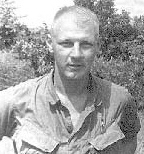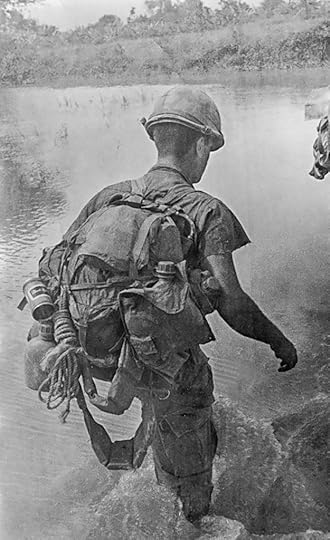Chuck Monahan – Executive Officer – Part One
The Road to Nam
I was in school at Springfield College in Massachusetts in pre-med, but I was a party-hearty student and after two years they asked me to leave. Through the local selective service I found out that I was coming up quickly for the draft and seeing as how I was interested in the medical field I enlisted to be a medic. I went to basic at Ft. Jackson in South Carolina. One of the training officers took a liking to me and asked me if I wanted to go to Officer Candidate School. I thought, what the hell, I’m in the Army I might as well make the best of it. I graduated from Artillery OCS at Ft. Sill, and from there went straight to Germany as a fire direction officer on 155 mm self-propelled howitzers.
Being in Germany was great with the exception of winter maneuvers. After a year in Germany I volunteered for Nam, and then thought about how crazy that was. I went to my colonel who was able to pull it back, but a week later I came down on a levy for Vietnam anyway.
Funny to You Maybe, But Not To Me
When I landed in Nha Trang I got assigned to 27th Field Artillery Regiment and I said, “What the hell’s that? What kind of guns?”
They said, “What kind do you want? The 27th has everything.”
I requested 155 mm Self Propelled because I was familiar with them. They told me that I would like 105’s. So at the 27th headquarters down in Phan Rang they assigned me to 105s at B Battery. But I didn’t go to the firebase right away. The rule was new lieutenants had to spend time as a forward observer, so I went up to Pleiku for forward observer school. Outside of the FO training at Ft. Sill I did not have any experience calling in artillery, and I don’t know how much the school helped to be perfectly honest.
I’m getting ready to deploy with Delta Company of the 3/506 Airborne Infantry out of LZ Betty. I’m 22 years old, green as can be, and in Vietnam for just a couple weeks. They said, “How much ammo do you want?” I must have taken half a dozen bandoliers with me. (An M-16 bandolier held seven ammo clips and was worn across the chest.) When I got on the chopper they laughed at me saying I was weighing down the helicopter.
They choppered me out to Delta Company in the field. I don’t know where I’m going, and they’re hovering over this elephant grass, and I see smoke, and they’re telling me to jump out. I say, “No way.” The Delta company First Sergeant is on the chopper with me and he pushes me out. From the ground I look up at the chopper and give him the finger, and he just laughs. The chopper takes off, I am all by myself, I don’t see anyone, and I am more than a little nervous.
Welcome to Vietnam. Then two guys come out of the brush and get me. What goes through my mind is, Why didn’t I study harder?
A couple of nights later we were set up in our nighttime position. It was September during monsoon season. I had called in rounds on one of the defensive targets I had set up around our perimeter, and it was wet and dark but quiet. Later that night one of our perimeter trip flares goes off right in front of us. I freeze. I look around and nobody’s moving. How come nobody’s moving? Then our Claymore mines go off. Not being familiar with claymore mines, I’m thinking that this is the end of the world for me. I jump into a foxhole and get ready to call in artillery, but it’s over before it started.
Captain Gerry Wrazen was my salvation. He had a great way about him, just exuded leadership. Confident in a mild mannered way. He was a natural. I was a very green and inexperienced FO in a tough infantry unit, and it was Captain Wrazen who helped me get along. He let you know he trusted you and I got close to him quickly.
 Captain Gerry Wrazen
Captain Gerry Wrazen
ADD 500
We had little skirmishes and small firefights during my time with Delta, and I had one bad night. It was still September with heavy monsoon rains, and from constantly trudging through the rice paddies everybody’s feet were beginning to rot. You never walked on top of the rice paddy dikes where it was dry, you always walked down in the paddy. It was so bad they brought the whole unit back into LZ Betty for three or four days of recuperation.
When we went back out to the field, October 4, that night around 7:00 we went to the southern end of Betty and were waiting for darkness to fall before heading out. Just as we are about to leave, word comes back from our point telling us that he thought he heard movement out in the rice paddies ahead of us. We looked at the map and it was a no-fire zone; there were a lot of those no-fire zones. If you were not in contact, it took an act of Congress to get permission to fire. We looked at each other and Wrazen said, “To hell with it. let’s just move out. It’s probably nothing.”
We started to move out. But this time because we had just recuperated from our feet being messed up, he said to walk on top of the dikes. We’re walking on the dikes and all hell broke loose. They had us in a cross fire with automatic weapons, and they started mortaring us. It was like nothing I had ever experienced. Everybody dove into the rice paddies. I got separated from my radio operator. I reached for my maps, and even though there was plastic on them, they were covered in mud. I am trying to get my bearings on the map to call in artillery. Meanwhile, Wrazen thought I was hit because he had yelled for me and I didn’t hear him, so he called for gunships. I got my RTO back, called to B Battery, and threw out a grid for them to fire on. I think I called for a white phosphorous round. I was laying on my back in the rice paddy – I remember this like it was yesterday – looking for the WP round to come in and there was nothing. I saw and heard nothing. I told the firebase to ADD 500. Now where did that come from?
Add 500 meters to the last shot. This was a daring adjustment, over five football fields, especially since the first shot was nowhere to be seen.
They fired and now I saw it and it’s close enough, so I started to adjust high explosive rounds on the target. The rounds started to land on the side of a hill close in front of us. I got real cautious since we in danger close range and I was leery of bringing them in any closer. About this time the gunships were coming in, which meant we had to wave off the artillery. The gunships quieted things down, allowing us to get to the side of a hill and dig in for the night.
I remember the next morning I had these huge blisters on the inside of both arms opposite my elbows. They were like large bubble gum bubbles. I called for the medic and then said to Wrazen, “I’m going home, baby; see you later.”
He looked at doc and said, “Bandage him up, he’s coming with me.” Doc poked the blisters, put some type of cream on, wrapped them, and that was it. I know we took casualties that night, but I don’t know how many and don’t remember the Medevacs.
Almost Famous
A photographer from Stars and Stripes embedded with the 101st took this picture of me as we were crossing a rice paddy. I had no idea there was a photographer with us, much less that he had taken a picture of me. One afternoon Captain Wrazen called me in and handed me a large glossy of this picture and said, “You created quite a stir.” He told me they were going to publish it in the paper, that is until the general got wind of it. The general went ballistic because the picture showed I had cut my sleeves off just below the shoulder, which I did because of the heat, but he thought defaced the uniform. Wrazen said, “The general yelled at the colonel, and the colonel yelled at me.” Of course it didn’t bother Gerry Wrazen at all. He shook his head and said, “Don’t ever do that again.”
I was an FO for just a month or two before going to Sherry. Most guys were out there for four or five months, some longer. You either hit it right, or you got screwed, and I hit it right. It was just the luck of the draw.




